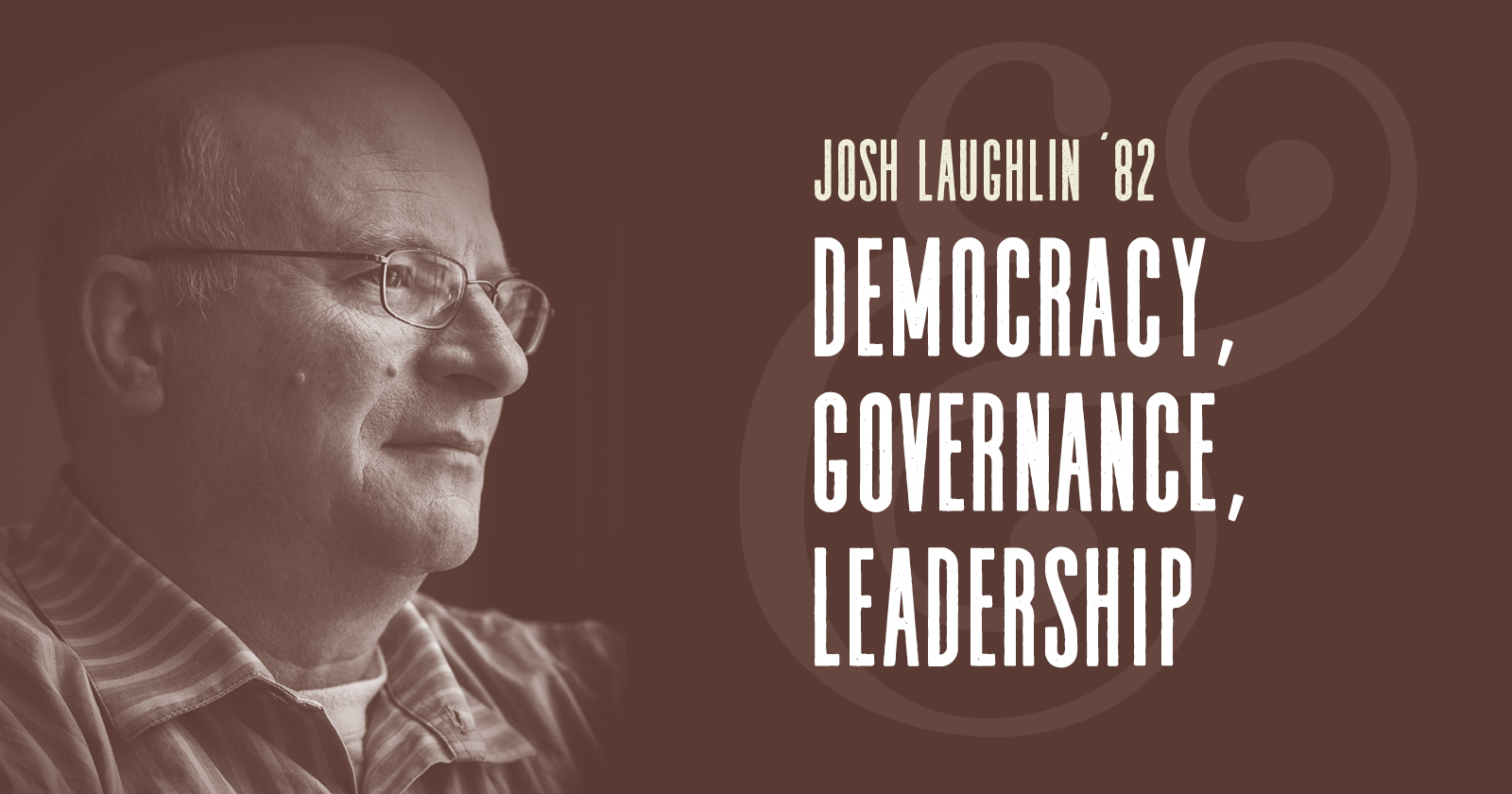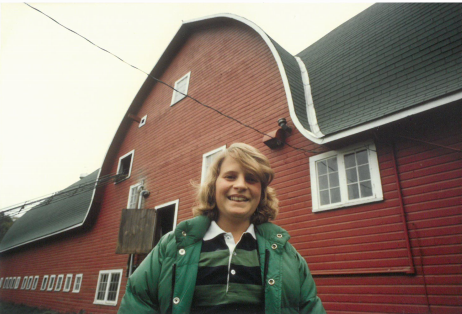
Josh Laughlin is of Putney. That he represents both the town and the school reflects both his current commitment and historical roots; his grandfather Edward H. Dodd, noted editor, publisher, and author, and an old friend of Carmelita Hinton, settled in Putney in the 1950s with his children Lisa ‘52, Roxanne ’54 (Josh’s mother), and Ted ’58, all attending The Putney School. Edward’s involvement in the Historical Society, in bringing Landmark College to town, and running a subsistence farm in Windmill Hill made him a de facto town father, moving and shaping the town from within. Edward died in Putney in 1988.
Josh grew up in New York city and attended The Putney School, graduating in 1982. Following Putney, he traveled for a year and then studied agronomy at SUNY Cobleskill and horticulture at Cornell. After college he bought a piece of land in Putney, serving on the Putney Fire Department and as an emergency medical technician at Rescue Inc. in Brattleboro, while designing and building his own home in 1989. Josh returned to the city to complete a degree in emergency medicine at Columbia University, before realizing the stress of urban crisis wasn’t his calling and returning to Putney to stay. He married Alice Luhrmann ’87 and started Tavern Hill Woodworks.
As they began to raise a family and start businesses in the community, Josh and Alice found their own involvement in civic organizations increasing, Alice as chair of the Putney Town School Board and Josh as Chair of the Town Select Board. Emily Jones, Putney’s Head of School, observed his skillful management of the town and, hoping to enhance the relationship between the town and school, recruited him for the Board of Trustees of The Putney School in 2011. He has been chair of the board since 2016.
The State of Vermont and The Putney School share parallel working models of the concept of democracy. John Dewey, perhaps our country’s most influential philosopher on education and democracy, born and raised in Vermont, believed that “the foundation of democracy is faith in the capacities of human nature; faith in human intelligence and in the power of pooled and cooperative experience.” Dewey believed that education played the essential role in creating citizens who possessed the capacity and will to make participatory democracy work. Mrs. Hinton, a devout adherent of Dewey, who according to one account met the great philosopher on a transatlantic passage (a story that remains to be told), echoed Dewey in her aspiration that through education one “definitely progresses along the long slow road toward achieving a civilization worthy of the name.” (from Putney’s Fundamental Beliefs). In Mrs. Hinton’s words there is no sense that you’re doing all this for yourself alone; a Putney education intends you to participate in, help build, and improve the world around you, and to act as a critically thinking, informed, and cooperative contributor to our political and social life. Mrs. Hinton saw The Putney School as the embodiment of education for democracy as Dewey envisioned it.

One of John Dewey’s favorite sayings was, “Democracy begins in conversation.” In Vermont, one of purest forms of democratic conversation, Town Meeting, persists. The opportunity to present your ideas, opinions, and petitions, and to debate and vote on issues of public concern is a still vital inheritance of pre-Revolutionary local control. Town Meeting has convened in Putney since 1770 to work out the tasks of running a town, from snow plows and fire trucks to schools and personnel. Daily matters are overseen by the Select Board that Josh chairs. The Select Board’s governing rationale is explicitly operational; its representatives are elected by town residents and entrusted to run the town, efficiently, like a business, with orderly, direct mechanisms to provide the best service within economic constraints.
Putney residents don’t need to be reminded of Tip O’Neil’s adage that “all politics is local”—Josh knows most of his constituents by name. His most important role in Town Meeting and on the Select Board is to make people feel their concerns are being addressed by translating legal and governmental complexities into plain English, explaining the meaning of specific statutes and articles, and boiling down exactly what is at stake in each decision.
The nature of governance of the board at The Putney School is somewhat less straightforward, its directives and responsibilities less prescribed, and its constituency defined quite differently. While the Town of Putney represents a wide disparity of income and age; the school exists for the benefit of an age band of four years from a primarily self-selecting and generally much wealthier community and who then leave (except maybe to return to serve on the board). The Putney School board can be more aspirational and creative in thinking because its basic purview is not operational and because the mission and demographic of the school is in every way more intentional. Though The Putney School board is not a representative board, it does comprise two students who are full voting members and participate in every deliberation and vote with the board as a whole. Referring to the student research and initiative that led The Putney School to align its investment policies and funds to the school’s ideals, Josh prizes the participation, opinions, and perspectives of the student board members, and knows students can get the attention of the full board and make change happen. As a Putney student, Josh was not involved in school government but felt very much part of a community that was self-supporting and in which everybody cared about everybody else.
In both decision-making bodies, Josh aims for consensus, and the two groups of highly independent-minded and often opinionated folks arrive at agreement more often than one might expect. Josh has a steadiness, unshakability, and seriousness of purpose about him that encourage resolution of matters at hand. Democracy is hard work, as are running a town and running a school, and friction is inevitable, but without humor, lively exchange, and enjoyment of each other’s company, the process can be drudgery. Always, Josh reminds those present to think of those not there to speak up. Josh reflects on the differing challenges faced by town and school. Democracy may begin in conversation, but most town residents don’t show up at Town Meeting, nor are their voices easily heard. The persistence of disadvantage and inequity in our political and social systems and the disparity of wealth (and opinion) in the Town of Putney remain disturbing issues. Josh also recognizes that the voices heard at The Putney School represent far less socio-economic diversity than the town that surrounds it and far less identity diversity than the country as a whole.
For Josh there’s always something that has to be thought about or responded to coming at him from anywhere in his Putney world. He wears this responsibility without discomfort or strain. He shows that leadership in a democracy, beyond the contribution of informed voice, is the coordination of those many voices towards the advancement of all.

